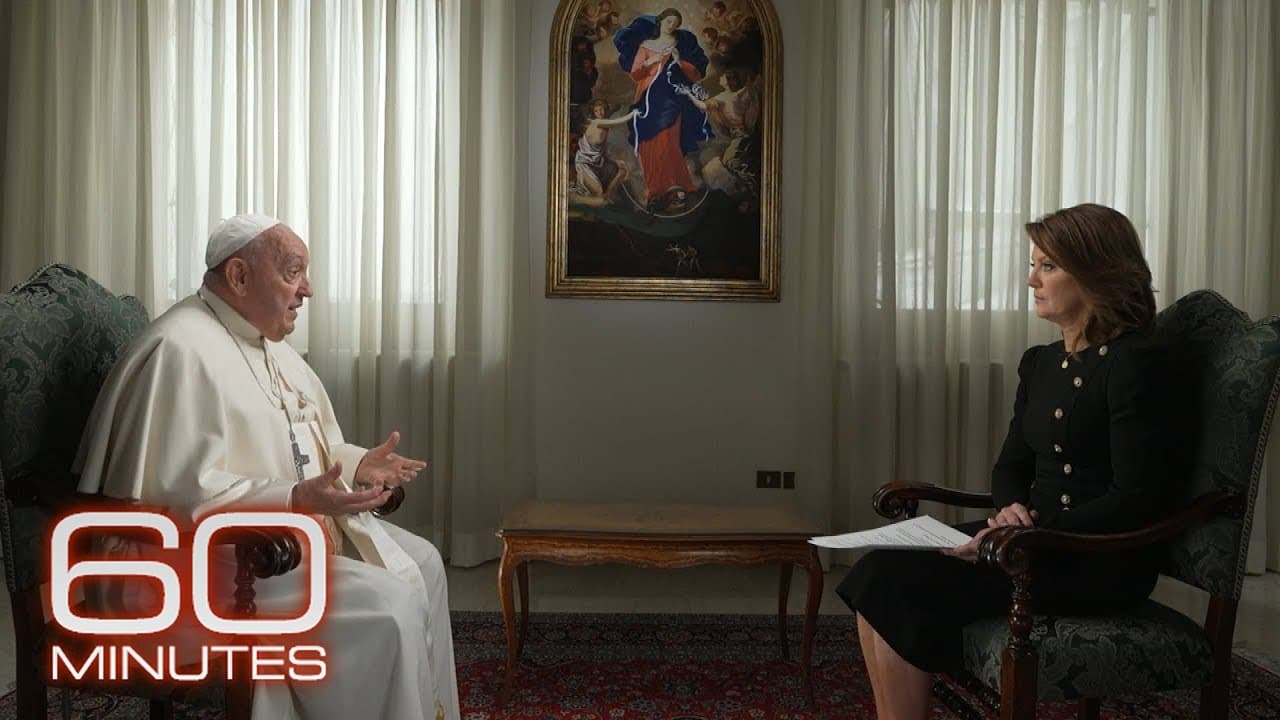Pope Francis; Cuban Spycraft; The Album | 60 Minutes Full Episodes
23 May 2024 (over 1 year ago)

Pope Francis' Interview on 60 Minutes
- Pope Francis expressed concern about the suffering of children affected by war and famine, calling for an end to conflicts and the pursuit of peace through negotiations.
- He criticized anti-Semitism and emphasized the importance of fostering peace and understanding between people of different backgrounds.
- Pope Francis shared his personal background and experiences, highlighting the need for compassion and humane treatment of migrants.
- He denounced the "globalization of indifference" and urged people to show empathy and take action in the face of human suffering.
- The Pope acknowledged the Catholic Church's history of sexual abuse scandals and emphasized ongoing efforts to address and prevent such abuses, with a commitment to zero tolerance.
- Pope Francis discussed his approach to homosexuality, stating that while he cannot bless same-sex unions, he believes in blessing individuals and promoting inclusivity.
- He addressed criticisms from conservative bishops who oppose his efforts to revisit church teachings and traditions, emphasizing the importance of considering situations and contexts rather than being rigidly bound by dogma.
- Despite placing more women in positions of power, Pope Francis maintains the church's traditional stance against ordaining women as priests or deacons.
- He expressed openness to considering surrogacy in certain cases, acknowledging the challenges faced by women who cannot bear children and emphasizing the need for careful evaluation of each situation.
- Pope Francis emphasized the importance of inclusivity and acceptance, stating that the church is for everyone, regardless of their background or circumstances.
Cuban Espionage
- Victor Manuel Rocha, a former American ambassador, pleaded guilty to spying for Cuba for his entire 40-year career.
- Rocha was recruited in the late 1970s and influenced by the radical politics of the day.
- Cuba's main export is American secrets, which they barter and sell to America's enemies worldwide.
- Cuban spycraft poses a real and present danger to US National Security.
- Anna Montes, a Pentagon analyst, was a Cuban spy for 17 years and known as the "queen of Cuba" in the intelligence community.
- Montes was recruited in the 1980s while a student at the Johns Hopkins School of Advanced International Studies.
- Driven by ideology rather than money, Montes was a full-fledged Cuban spy from the moment she joined the Defense Intelligence Agency (DIA).
- Montes revealed the existence of a top-secret satellite program used by the US to spy on other countries and gave Havana the names of 450 American intelligence officials working on Latin American issues.
- Montes pleaded guilty to espionage and agreed to tell the FBI everything she had done in exchange for not spending the rest of her life in prison.
- Ana Montes, a Cuban spy who served 20 years in federal prison, was released in January 2023.
- Montes has not expressed any remorse for her actions and is considered one of the most notorious spies in American history.
The Auschwitz Photo Album
- A new play, "Here There Are Blueberries," is based on the true story of a photo album from Auschwitz sent to the United States Holocaust Memorial Museum.
- The album contains 116 photographs taken by an SS officer at Auschwitz, showing the perpetrators of the Holocaust enjoying themselves.
- The play's main character, Rebecca Rebelling, is a historian at the Holocaust Museum who becomes obsessed with the album and uncovers the identities of the people in the photographs.
- The album reveals that the Nazis built a vacation resort at Auschwitz called Sulah Huta, where they celebrated the successful mass murder of Hungarian Jews.
- Irene Weiss, a Holocaust survivor, was photographed by a Nazi photographer as she arrived at Auschwitz.
- Weiss spent the next 8 months working outside one of the gas chambers, sorting shoes and other belongings of the dead.
- Tillman Tab discovered photos of his grandfather, Dr. Hin Bom Cotter, in Carl Hawker's album, revealing his involvement in medical experiments and sending prisoners to death camps during the Holocaust.
- Tab was aware of his grandfather's role as head physician at the Sachsenhausen concentration camp but was surprised by the extent of his involvement in Auschwitz.
- Tab collaborated with Rebecca Oring to uncover more information about his grandfather's actions during the Holocaust.
- The play about the Hawker album raises questions about the past and human nature, exploring how highly educated physicians could become systematic killers.
- The importance of understanding the perspectives of those involved in atrocities is emphasized, as they did not perceive themselves as evil but rather justified their actions.
60 Minutes Segment on Permission and Authority
- The video highlights the dangers of permission and authority in allowing individuals to turn into animals capable of attacking, excluding, or shaming certain groups.
- The segment concludes with a tribute to Frank Devine, a retiring senior producer at 60 Minutes, acknowledging his contributions to the program and his belief in the significance of facts and meaningful writing.